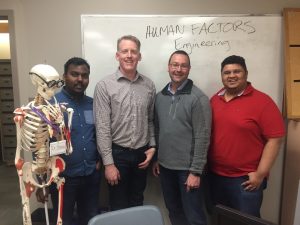Ergo U: Ryerson University: The Impact of Ergonomics on Business Performance
06/27/2018


In the series Ergo U: Ergonomics Research Notes from the Field, Humantech ergonomist Blake McGowan meets with ergonomics researchers from leading universities and associations across the country to share their latest findings.

Dr. Neumann
Field Notes: Recently, Blake had the opportunity to meet with Dr. Patrick Neumann from the Department of Mechanical and Industrial Engineering at Ryerson University to discuss the impact of proper ergonomics design on employee well-being and business performance.
Blake’s Take: “Dr. Neumann’s work is on the cutting edge of human factors in organizational design and management (ODAM) research (originally termed macroergonomics). His 2009 paper, “Ergonomics Contributions to Company Strategies”, co-authored by Jan Dul of the Rotterdam School of Management at Erasmus University Rotterdam, reminded me that ergonomics is and will always be an engineering discipline that focuses on improving human performance. The results of his research clearly demonstrate that good ergonomics improves business performance and provides a competitive advantage, and most interesting is the substantial impact it has on product quality and manufacturing productivity.
In addition, we discussed his groundbreaking research on the ‘Ergo-Brand’ proposition, which suggests that consumers prefer to buy goods made under good working conditions, a goal of ergonomics. As a result, those companies gain a competitive advantage when ergonomics processes and guidelines are implemented.

Dr. Greig (center left) and McGowan (center right) with graduate students
Additional Activities: Blake also met with Dr. Michael Greig about his research predicting physical workload and task times from workstation layout design data. "His tool is excellent in that it assists engineers during the design phase of a manufacturing process and proactively identifies ergonomics and productivity issues."
Expert: Dr. Patrick Neumann (PhD: Lund Technical University - Sweden) focuses on the design of work systems that are both effective and sustainable from human and technical perspectives. His areas of study include human factors and corporate strategy, industrial system design processes, organizational design and change management, simulation and virtual performance modeling, and performance and exposure measurement.






